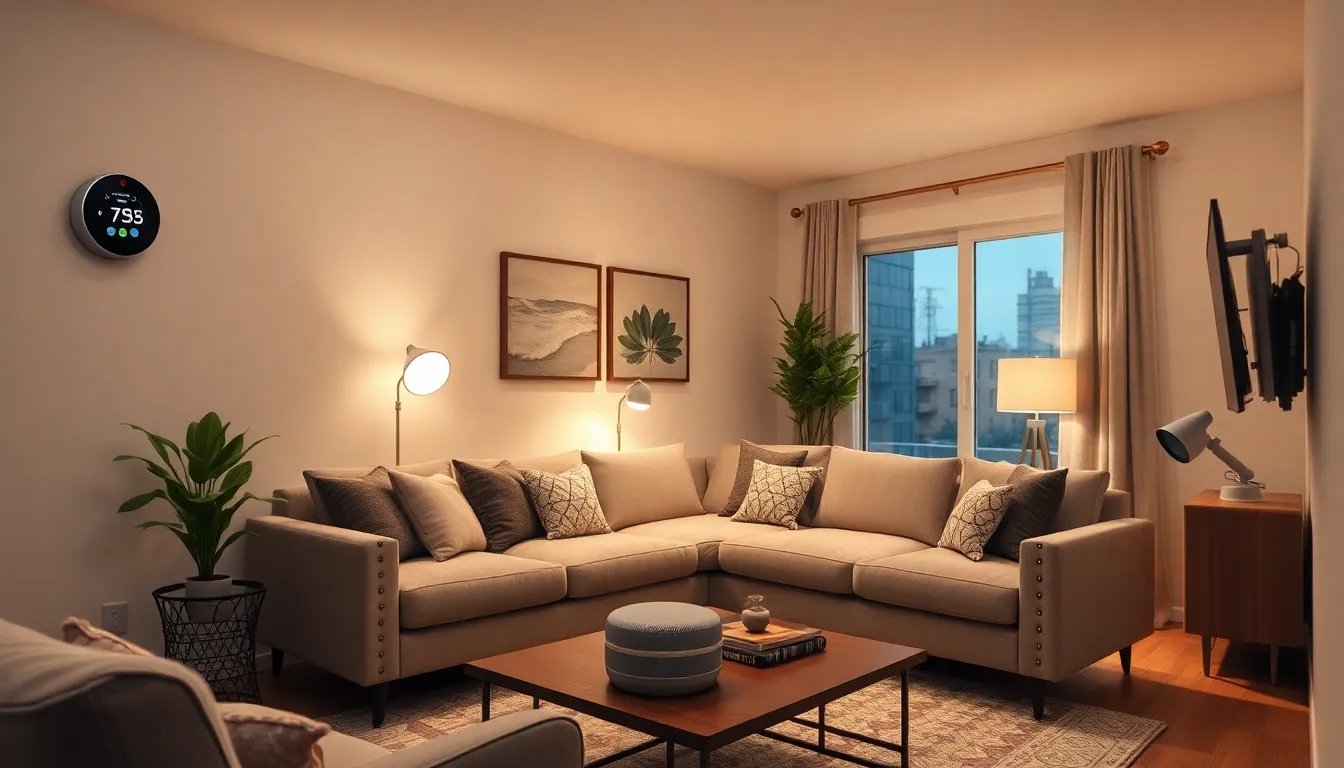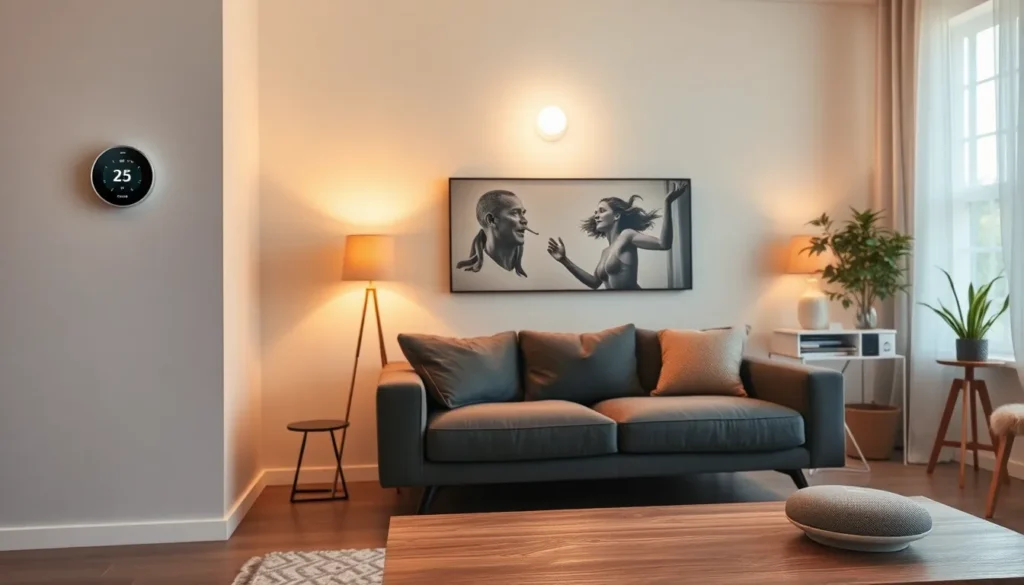In a world where even your toaster might have a better social life than you, smart home devices are taking center stage. Imagine controlling your lights, thermostat, and even your coffee maker with just a few taps on your phone—it’s like living in a sci-fi movie, minus the flying cars. These gadgets not only make life easier but also add a sprinkle of magic to everyday routines.
Table of Contents
ToggleOverview Of Smart Home Devices
Smart home devices transform how individuals manage their homes. These gadgets provide the ability to control lighting, temperature, security, and appliances remotely. With just a smartphone or tablet, users can adjust settings while away from home or prepare their living environment before arrival.
Connected lighting systems allow for customizable brightness and color options. They create ambiance tailored to specific activities or moods. Smart thermostats optimize energy usage by learning user preferences and adjusting heating or cooling accordingly. This can lead to significant savings on energy bills over time.
Home security devices enhance safety with smart locks, video doorbells, and surveillance cameras. These devices provide real-time alerts and remote monitoring, ensuring peace of mind. Additionally, smart appliances like refrigerators and washing machines offer convenience by enabling users to control cycles from their mobile devices.
Voice-activated assistants, such as Amazon Alexa or Google Assistant, streamline interactions with smart home technology. These platforms allow for seamless integration across multiple devices. Users can issue commands for tasks like turning off lights or setting reminders hands-free.
Data from recent studies indicates that the smart home market is expected to reach $174 billion by 2025. This growth reflects increasing consumer demand for convenience and enhanced living experiences. As more households adopt these innovations, the smart home ecosystem continues to expand, shaping future lifestyles.
Overall, smart home devices provide a combination of convenience, security, and energy efficiency, making them essential for modern living.
Types Of Smart Home Devices

Smart home devices encompass various technologies that enhance comfort and security in daily living. Each type plays a unique role in improving home management.
Smart Security Systems
Smart security systems safeguard homes with advanced features. They include smart locks that provide keyless entry for authorized users. Surveillance cameras offer real-time video monitoring and motion detection alerts, ensuring enhanced safety. Remote access allows homeowners to check their property from anywhere. Integration with mobile apps streamlines security management, making it convenient to monitor multiple devices.
Smart Lighting Solutions
Smart lighting solutions offer flexibility and personalization in lighting management. Users can control brightness and color through voice commands or mobile apps. Automated schedules allow lights to turn on or off based on daily routines. Energy-efficient options reduce electricity consumption while providing ambiance. Compatibility with other smart devices creates an interconnected environment for seamless control.
Smart Thermostats
Smart thermostats optimize energy consumption effectively. They learn user preferences to adjust heating and cooling automatically, leading to improved efficiency. Remote control through mobile applications allows users to set temperatures from anywhere. Integration with weather forecasts helps in making informed adjustments for comfort. These devices can yield substantial savings on energy bills over time.
Smart Appliances
Smart appliances enhance convenience and efficiency in household tasks. Refrigerators with inventory management notify users when supplies are low, assisting in meal planning. Smart ovens can be preheated or monitored remotely, allowing multi-tasking. Washing machines with customizable settings enable efficiency based on fabric types. Integration with voice assistants makes it easy to control appliances hands-free.
Benefits Of Using Smart Home Devices
Smart home devices offer numerous advantages that significantly improve everyday living. Users experience greater comfort and efficiency, simplifying the management of their homes.
Energy Efficiency
Smart thermostats adapt to individual routines, reducing energy waste and optimizing heating and cooling. By learning preferences, these devices lower utility bills over time, with potential savings of up to 30%. Smart lighting systems adjust brightness levels and turn off automatically, ensuring lights aren’t left on unnecessarily. Energy-efficient appliances further enhance savings by using less power than traditional models. With these features combined, households can achieve an eco-friendly lifestyle while cutting costs.
Enhanced Security
Smart security systems provide peace of mind with features like remote monitoring and real-time alerts. Homeowners can access live video feeds through their smartphones, enabling them to check their property anytime, anywhere. Smart locks offer keyless entry, making it easier to manage access for family or guests. Automated alerts notify users of any suspicious activity, adding a layer of protection. This level of security not only enhances personal safety but also deters potential intruders.
Convenience and Automation
Voice-activated assistants streamline daily tasks, allowing users to control various devices effortlessly. Automating schedules for lights and appliances create a hands-free lifestyle that saves time. Smart devices connect through apps, enabling remote management from anywhere, thus increasing flexibility. With compatible gadgets working in unison, routines become more enjoyable and less burdensome. This seamless integration transforms ordinary tasks, promoting a modern, efficient home environment.
Challenges And Considerations
Smart home devices come with several challenges and considerations that users should evaluate. Addressing these risks and issues enhances the overall experience of smart living.
Privacy and Security Risks
Privacy concerns pose significant challenges for smart home device users. Data breaches occur, potentially exposing personal information. Devices can be vulnerable to hacking, where unauthorized access becomes a serious threat. Users often overlook the importance of securing Wi-Fi networks, which can lead to unauthorized entry into their smart home systems. Regular software updates mitigate some risks, but users must remain vigilant to ensure their data stays protected.
Compatibility Issues
Compatibility remains a common issue with smart home devices. Users often encounter problems when trying to integrate devices from different manufacturers. Lack of standardized protocols complicates the situation, leading to frustration. Some devices only work within specific ecosystems, limiting options for users looking to mix and match products. Users should research compatibility before purchasing, ensuring a seamless smart home experience.
Cost Considerations
Cost considerations play a crucial role in adopting smart home technology. Initial investment costs can be high, with many devices requiring significant financial outlay. Energy savings over time may offset these upfront expenses, yet users must evaluate overall value. Budgeting for ongoing subscription fees is essential, as some smart devices rely on cloud services that charge monthly or annual fees. Strategic planning ensures users make informed choices while upgrading their homes.
Smart home devices are reshaping how individuals manage their living spaces. With the ability to control lighting security and appliances from a smartphone users can enjoy a more efficient and convenient lifestyle. The benefits of these technologies extend beyond mere convenience; they also enhance energy efficiency and home security.
However it’s important to remain aware of potential challenges such as privacy concerns and compatibility issues. By staying informed and proactive users can fully embrace the advantages of smart home technology while mitigating risks. As the market continues to grow the future of smart living looks promising offering endless possibilities for innovation and enhanced daily experiences.

